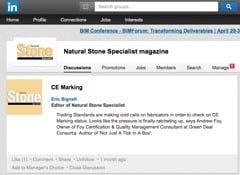Flurry of online activity over comment that Trading Standards are planning cold calls over CE marking
It started with a Tweet. Then a post on LinkedIn. Then it was re-Tweeted and re-posted on construction sector forums around the internet.
Join the Natural Stone Specialist group on LinkedIn
What started it was a comment that Trading Standards had started making cold calls on fabricators in order to check on their CE marking status.
It looked as if the pressure was finally ratcheting up, said Andrew Foy, Owner of Foy Certification & Quality Management, which helps companies obtain management standards such as ISO9001. Andrew is also the author of Not Just A Tick In A Box.
The reaction to the comment is an indication of the level of concern and some confusion that still surrounds CE marking more than 18 months after it became law on many construction products as part of Building Regulations.
There is a growing disquiet among companies that have gone to the expense of CE marking their products that nothing is happening to those that continue to sell products not CE marked.
As Dave Stanger, National Commercial Manager at Marshalls Natural Stone, says in the Stone Federation group discussion about Andrew Foy’s comment on LinkedIn: “We've gone to huge expense to ensure that our indigenous and imported range of natural stone materials have been tested and CE marked to comply with regulations, but who is policing those who don’t?
“There seems to be little or no fear from those customers we talk to about people not supplying CE data and so it begs the question of why bother having a law / regulation…?
“I fully support the approach our business and those around us have taken to ensure we meet and deliver on our moral obligations but would welcome some joined up thinking on how we better promote the requirement for CE marking or how we arrange for it to be policed?
“Perhaps we engage the likes of RIBA, Landscape Institutes, ICE, etc to educate them top down...”
His colleague Andrew Shutt at Marshalls’ Stancliffe Stones adds: “Not helped by the fact we can supply a cladding panel or walling stone that needs CE marking but a coping stone or window cill that doesn’t.”
Michael Poultney, Managing Director at Albion Stone, says: “We have nearly 40 CE Certificates for the various applications of our Portland stone but some companies have nearly 300 certificates, so the expense has been considerable.”
He says British stone producers have seen CE marking as a way of stopping imports being passed off as indigenous stone and that clients need to understand the importance of CE marking. “That can only be highlighted to them by well publicized disasters, unfortunately.”
Andrew Foy, who started the online debate, agrees. He told NSS: “When Mr Morrison can’t open a supermarket because it was built using non-CE marked products, it might hit the fan.”
Concerns over CE marking of building products are not confined to the stone industry. Andrew Foy says he initially Tweeted because he had heard about Trading Standards’ cold calls in the North West from a reliable source in the structural steel sector.
He says only 40 of the 10,000 steel fabricators in the UK had CE marked their structural steel products in the first nine months after it became compulsory to do so but, in the past month alone, 300 more had signed up to get their products marked, which seemed to indicate word was spreading and reluctance dwindling.
The debate has also been taking place in the Streetwise Subbie group on LinkedIn, where Tracy-Jane (TJ) Duncan-Moir, a Director at A1 Flue Systems, says: “It’s about time something was put in place to police CE marking. It’s so frustrating for companies who have taken the time and expense of this to then have work taken away by cowboys who haven’t. Companies should be named and shamed to help with the policing of this.”
It is not only a lack of CE marks that are concerning people but also the appearance of bogus CE marks.
Another Streetwise Subbie contributor said he knew of a company which had changed the declared values on CE marks. “We need to get rid of these ‘rogue traders’,” he said.
‘CE marks’ also appear on some imports from China. The marks look remarkably like European CE marks but the Chinese insist they indicate the products are ‘China Exports’.
There will be a presentation about CE marking during the ‘Industry Day’ conference at the Natural Stone Show at ExCeL London 28-30 April (see page 18) as well as more information about CE marking on the Stone Federation stand, including details of the CE-marked stones of member companies.

